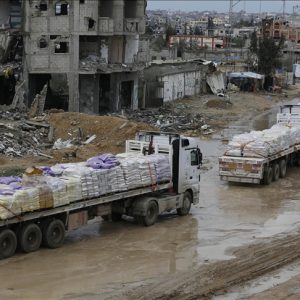Kyrgyzstan turns to artificial glaciers as climate change threatens water supply
BISHKEK, Kyrgyzstan (MNTV) — As the world marked the first-ever World Day for Glaciers last month, Kyrgyzstan has showcased an innovative response to climate change—artificial glaciers designed to support rural communities facing water shortages.
In late 2024, the Food and Agriculture Organization of the United Nations (FAO) constructed seven artificial glaciers in villages across the Batken region in southern Kyrgyzstan.
Over the winter, these glaciers accumulated more than 1.5 million cubic meters of ice, which is now beginning to melt, providing crucial irrigation water for agriculture.
FAO experts estimate that more than 1,750 hectares of farmland—about 2,451 football fields—will benefit from the meltwater. If modern irrigation systems are adopted, the reach could expand to 15,000 hectares.
According to The Times of Central Asia, the artificial glaciers were built using a simple method. Water from mountain springs is funneled through pipelines to a 10-15 meter vertical pipe, where it is sprayed into the freezing air. The droplets crystallize, gradually forming ice cones that store water for the dry months ahead. Each artificial glacier can support irrigation on 300 to 500 hectares of land.
“The key is to choose the right location,” said Matraim Jusupov, an FAO water-saving expert. The FAO provided materials and technical expertise, while local residents carried out construction, laying nearly seven kilometers of pipeline.
Climate data from the World Meteorological Organization (WMO) and the World Glacier Monitoring Service (WGMS) paints a dire picture.
Five of the past six years have seen the fastest glacier retreat ever recorded, with 2022–2024 marking the largest three-year loss of glacier mass in history. Once considered “eternal ice,” many glaciers may not survive the 21st century.
Glaciers store 70% of the planet’s freshwater, and their depletion threatens water security for hundreds of millions of people. Recognizing the crisis, the UN General Assembly declared 2025 as the International Year of Glaciers’ Preservation and designated March 21 as World Day for Glaciers.
A Kyrgyz delegation, led by Dinara Kemelova, attended UNESCO-hosted events in Paris on March 20-21.
Kemelova, the President’s Special Representative for Mountain Regions Development, emphasized Kyrgyzstan’s role in advocating for glacier preservation. She warned of the rapid loss of glaciers in the country and urged immediate regional and global action.
Kyrgyzstan will continue its climate efforts at the Global Mountain Dialogue for Sustainable Development, scheduled for April 24-25 in Bishkek.
The event will focus on scientific research, policy solutions, and financing mechanisms to tackle the climate crisis in mountain regions.







